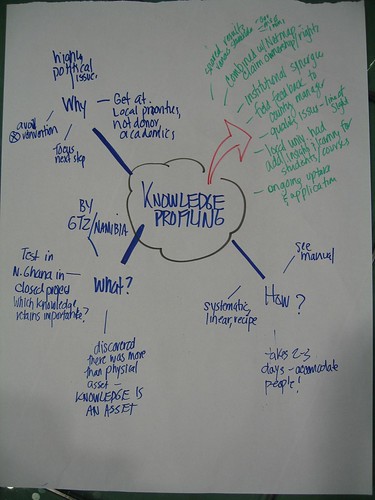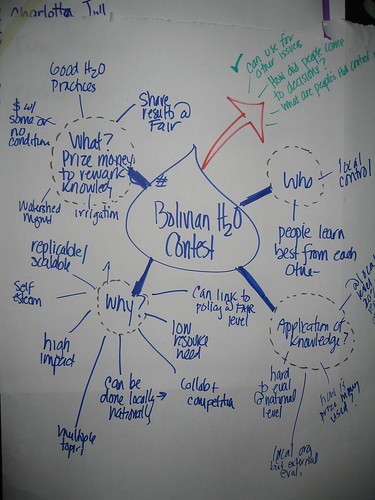 Session Report: Knowledge Sharing on Good Water Governance
Session Report: Knowledge Sharing on Good Water GovernanceRoom: Facilitation Room
Time: 21 January 2009, 15:30 - 16:45
When I reviewed the submissions for the last panel I was facilitating today (Knowledge Sharing Methods on Good Water Governance), I was struggling to imagine the "hook" for the conversation across the projects. There is this interesting tension in many of the sessions, which is how much focus should we put on the domain/content (in this case governance in water issues) and how much on the theme of the fair, knowledge sharing? Because we all value the practical application of KS, this balance is important. We want to increase our KS skills, but not in some theoretical vacuum. So the hook between the content and the KS issues is important to me.
Well once Moses started talking about the application of Net Mapping to a dam project in Northern Ghana, the use of Knowledge Profiling in identifying knowledge as a product of a project and Frank shared the application of contests in a water governance initiative in Bolivia, I had a little aha. It should have been obvious, but sometimes we need to hear stories of use to see the light.
 This was a really useful case of seeing various methods as not just the methods themselves, but as knowledge sharing methods. Why is this important? I think when we look at our work with a KS "lens" we see some different things. For example, in the NetMapping story of Ghana, Moses stated they used it initially at the close of a project as more of a post evaluation method. But as they used and deepened their knowledge of the method application, they saw that not only did they gain social network analysis data, but they observed how the method influenced the communication in the work, and how people begin to see new possibilities through this very visual method. Moses noted that they now see the method as something they can use at any phase of a project and that while it requires trust, it also generates some deeper communication. So this very act of knowledge sharing, as I understood it, changed the dynamics of the work.
This was a really useful case of seeing various methods as not just the methods themselves, but as knowledge sharing methods. Why is this important? I think when we look at our work with a KS "lens" we see some different things. For example, in the NetMapping story of Ghana, Moses stated they used it initially at the close of a project as more of a post evaluation method. But as they used and deepened their knowledge of the method application, they saw that not only did they gain social network analysis data, but they observed how the method influenced the communication in the work, and how people begin to see new possibilities through this very visual method. Moses noted that they now see the method as something they can use at any phase of a project and that while it requires trust, it also generates some deeper communication. So this very act of knowledge sharing, as I understood it, changed the dynamics of the work.We had less detailed information about the profiling method from Rudolph. My sense it was a more structured and detailed process, but again, it helps the participants "see" the learning in a different way. And thus share it in a different way. They noted that the Knowledge Profile results were useful in an academic setting and more formal evaluation. While the NetMap addressed the social and power aspects of the work.
 Finally, Frank observed that using contests was both a well documented method useful in many contexts and domains, but a real insight for me was his suggestion that it is a good starter method to uncover knowledge that can be more formally assessed with the Knowledge Profile and to help guide the design of work.
Finally, Frank observed that using contests was both a well documented method useful in many contexts and domains, but a real insight for me was his suggestion that it is a good starter method to uncover knowledge that can be more formally assessed with the Knowledge Profile and to help guide the design of work.How do we pick these methods? What is a good mix or sequence? Does the selection vary widely by context or are there some useful use practices we can uncover?
We can't know this unless we continue to swap stories as we did this afternoon. So for me the hook is to add a layer of learning while doing about methods and process, then share that learning outside and across our work to see if we can surface the range of methods and their applications for knowledge sharing in agriculture and food security.

No comments:
Post a Comment